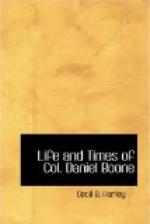Petitions to the Legislature for a redress of grievances were treated with contempt. The people assembled and formed themselves into an association for regulating public grievances and abuse of power. Hence the name given to them of Regulators. They resolved “to pay only such taxes as were agreeable to law and applied to the purpose therein named, to pay no officer more than his legal fees.” The subsequent proceedings of the Regulators, such as forcible resistance to officers and acts of personal violence toward them, at length brought on an actual collision between them and an armed force led by the Royal Governor, Tryon (May 16 1771,) at Alamanance, in which the Regulators were defeated; and the grievances continued with scarcely abated force till the Revolution brought relief.
Under these circumstances, it is not surprising that Daniel Boone and others were quite willing to migrate to the West, if it were only to enjoy a quiet life; the dangers of Indian aggression being less dreaded than the visits of the tax-gather and the sheriff; and the solitude of the forest and prairie being preferred to the society of insolent foreigners; flaunting in the luxury and ostentation purchased by the spoils of fraud and oppression.
Among the hunters and traders who pursued their avocations in the Western wilds was John Finley, or Findley, who led a party of hunters in 1767 to the neighborhood of the Louisa River, as the Kentucky River was then called, and spent the season in hunting and trapping. On his return, he visited Daniel Boone, and gave him a most glowing description of the country which he had visited—a country abounding in the richest and most fertile land, intersected by noble rivers, and teeming with herds of deer and buffaloes and numerous flocks of wild turkeys, to say nothing of the smaller game. To these descriptions Boone lent a willing ear. He resolved to accompany Finley in his next hunting expedition, and to see this terrestrial paradise with his own eyes, doubtless with the intention of ultimately seeking a home in that delightful region.
Accordingly, a company of six persons was formed for a new expedition to the West, and Boone was chosen as leader. The names of the other members of this party were John Finley, John Stuart, Joseph Holden, James Moncey, and William Cool.




